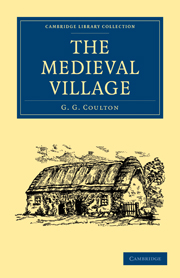Book contents
- Frontmatter
- GENERAL PREFACE
- AUTHOR'S PREFACE
- Contents
- LIST OF ILLUSTRATIONS
- ABBREVIATIONS AND AUTHORITIES
- CHAPTER I THE OPEN ROAD
- CHAPTER II VILLAGE DEVELOPMENT
- CHAPTER III A FEW CROSS-LIGHTS
- CHAPTER IV A GLASTONBURY MANOR
- CHAPTER V THE SPORTING CHANCE
- CHAPTER VI BANS AND MONOPOLIES
- CHAPTER VII THE MANOR COURT
- CHAPTER VIII LIFE ON A MONASTIC MANOR
- CHAPTER IX FATHERLY GOVERNMENT
- CHAPTER X THE LORD'S POWER
- CHAPTER XI EARLIER REVOLTS
- CHAPTER XII MONKS AND SERFS
- CHAPTER XIII THE CHANCES OF LIBERATION
- CHAPTER XIV LEGAL BARRIERS TO ENFRANCHISEMENT
- CHAPTER XV KINDLY CONCESSIONS
- CHAPTER XVI JUSTICE
- CHAPTER XVII CLEARINGS AND ENCLOSURES
- CHAPTER XVIII CHURCH ESTIMATES OF THE PEASANT
- CHAPTER XIX RELIGIOUS EDUCATION
- CHAPTER XX TITHES AND FRICTION
- CHAPTER XXI TITHES AND FRICTION (CONTINUED)
- CHAPTER XXII POVERTY UNADORNED
- CHAPTER XXIII LABOUR AND CONSIDERATION
- CHAPTER XXIV THE REBELLION OF THE POOR
- CHAPTER XXV THE REBELLION OF THE POOR (CONTINUED)
- CHAPTER XXVI THE DISSOLUTION OF THE MONASTERIES
- CHAPTER XXVII CONCLUSION
- APPENDIXES
- POSTSCRIPTS
- INDEX
- Plate section
CHAPTER XVI - JUSTICE
Published online by Cambridge University Press: 06 December 2010
- Frontmatter
- GENERAL PREFACE
- AUTHOR'S PREFACE
- Contents
- LIST OF ILLUSTRATIONS
- ABBREVIATIONS AND AUTHORITIES
- CHAPTER I THE OPEN ROAD
- CHAPTER II VILLAGE DEVELOPMENT
- CHAPTER III A FEW CROSS-LIGHTS
- CHAPTER IV A GLASTONBURY MANOR
- CHAPTER V THE SPORTING CHANCE
- CHAPTER VI BANS AND MONOPOLIES
- CHAPTER VII THE MANOR COURT
- CHAPTER VIII LIFE ON A MONASTIC MANOR
- CHAPTER IX FATHERLY GOVERNMENT
- CHAPTER X THE LORD'S POWER
- CHAPTER XI EARLIER REVOLTS
- CHAPTER XII MONKS AND SERFS
- CHAPTER XIII THE CHANCES OF LIBERATION
- CHAPTER XIV LEGAL BARRIERS TO ENFRANCHISEMENT
- CHAPTER XV KINDLY CONCESSIONS
- CHAPTER XVI JUSTICE
- CHAPTER XVII CLEARINGS AND ENCLOSURES
- CHAPTER XVIII CHURCH ESTIMATES OF THE PEASANT
- CHAPTER XIX RELIGIOUS EDUCATION
- CHAPTER XX TITHES AND FRICTION
- CHAPTER XXI TITHES AND FRICTION (CONTINUED)
- CHAPTER XXII POVERTY UNADORNED
- CHAPTER XXIII LABOUR AND CONSIDERATION
- CHAPTER XXIV THE REBELLION OF THE POOR
- CHAPTER XXV THE REBELLION OF THE POOR (CONTINUED)
- CHAPTER XXVI THE DISSOLUTION OF THE MONASTERIES
- CHAPTER XXVII CONCLUSION
- APPENDIXES
- POSTSCRIPTS
- INDEX
- Plate section
Summary
“Justice is great profit”; so ran the medieval lawyers' proverb, in the sense that rights of justice over the people were very lucrative. The lord reaped a fine for almost every offence; he took a fine from litigants if they came to an agreement outside his court; he took all the chattels of the condemned felon or of the fugitive offender; he took a fee from the serf who wanted to search the court-rolls for information as to his dues and services. Ecclesiastical judges throve even more, if possible, on the fines taken for offences; the bishops, writes Gower, take bribes wholesale, and the deans of Christianity “desire sin; for our dean gets far more profit from a harlot than from a nun”. In the courts even of kings and princes, we have seen how the poor had little chance of a hearing, since they brought no gifts to the judges; and there is no reason to surmise a higher standard in the manor courts. Or rather, there is every reason to surmise an even lower standard; the steward or bailiff has as bad a reputation in the Middle Ages as the miller. The Council of Tours, in 813, complained that the country was full of false witnesses ready to testify to anything for a small bribe (§34); Gower, again, speaks of these professional perjurers; and there is a plain allusion to the same subject in Piers Plowman.
- Type
- Chapter
- Information
- The Medieval Village , pp. 187 - 207Publisher: Cambridge University PressPrint publication year: 2010First published in: 1925

